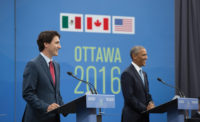A long-running trade dispute between the U.S. and Canada over lumber pricing has flared up again.
U.S. Trade Representative Ron Kirk said on Jan. 18 that he is seeking binding arbitration to settle a disagreement between the two countries over the pricing of British Columbia timber. Lumber produced from that timber is a key component in the construction of single-family housing.
To try to resolve lumber-pricing disagreements that stretched back 20 years, the U.S. and Canada in 2006 signed a Softwood Lumber Agreement (SLA). The pact set a price threshold at which limits would cease on Canadian lumber exports. A sliding scale of export charges takes effect when prices slip below that threshold. In addition, Canadian companies received more than $4 billion of an estimated $5 billion in accumulated duties the U.S. had collected.
But the 2006 settlement hasn’t settled everything. The issue that sparked Kirk’s request is British Columbia’s pricing of timber cut from public lands in the province’s Interior region. The U.S. contends that B.C. sells that timber at 25¢ per cubic meter, which the USTR office says is a “very low” rate. The U.S. also claims that the share of timber from these public lands “has increased dramatically” since the 2006 pact took effect.
Kirk said, “Canada is providing an additional benefit to Canadian exporters of softwood lumber by selling timber harvested from public lands for prices below those provided for under the timber pricing system grandfathered under the SLA.”
He added, “By doing so, Canada is in breach of its commitments under the agreement.”
But Peter Van Loan, Canada’s minister of international trade, countered, “There is no justification for arbitration, and Canada will vigorously defend the interests of its softwood lumber industry.”
Van Loan said the increased share of “low-value logs” harvested in B.C. reflects “the unprecedented infestation of the mountain pine beetle.”
The Coalition for Fair Lumber Imports, which represents U.S. lumber producers, praised Kirk’s action. Coalition Chairman Steve Swanson said, “The enormous increase in the amount of timber priced at the 25¢-cu-m minimum price has saved B.C. Interior lumber producers hundreds of millions of dollars in fiber costs,” compared with the pricing system in effect at the time of the 2006 pact.
Swanson added, “The B.C. government’s expanded and unfair subsidy to B.C. Interior mills has had devastating effects on the rest of the industry outside B.C.—both in the United States and Canada.”
The binding arbitration that Kirk has requested is provided for under the 2006 SLA. It would be the third SLA arbitration proceeding that the U.S. has sought.
A London Court of International Arbitration tribunal on Jan. 21 released a decision on one of those earlier proceedings. Kirk said the tribunal found that some Quebec and Ontario provincial assistance programs for the Canadian lumber industry breached provisions of the SLA. The USTR’s press release called the ruling a “victory.” Van Loan said Canadian officials were reviewing the decision and its impact on the industry but said, “I note that the tribunal rejected 97% of the United States’ $1.86-billion claim as having no basis.”
The first arbitration proceeding resulted in a February 2009 finding that Canada did not properly calculate quotas in the first half of 2007 and that it should impose about $68 million in additional export duties.



Post a comment to this article
Report Abusive Comment